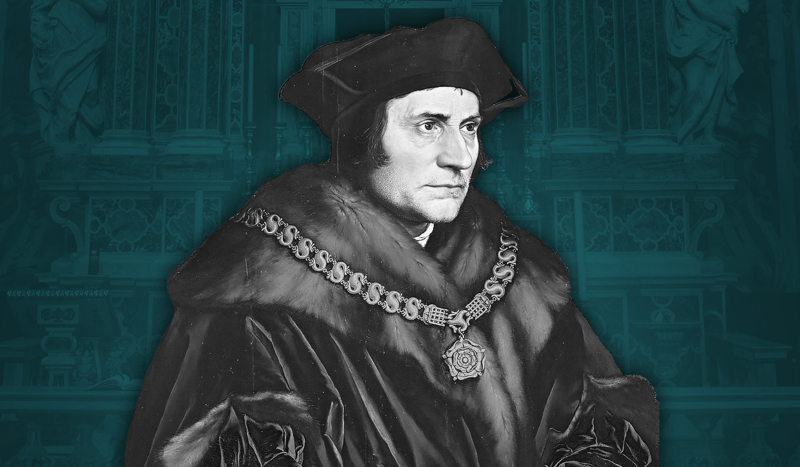
One of CatholicVote’s patron saints, St. Thomas More, was a husband, father, lawyer, writer, philosopher, and political advisor in 16th-century England. He was martyred at the hands of King Henry VIII for refusing to break with the Catholic Church and rejecting the king’s notion of “royal supremacy.” In doing so, the saint sacrificed his worldly prestige and material wealth for the unceasing Kingdom of God.
St. Thomas More’s immense moral courage during a time of persecution serves as a reminder to all of us. Like him, we are all called to a life of holiness. The question is, do we choose to embrace the suffering and trials we face on earth and unite them to Christ’s Passion and Cross? Or do we instead give up our heavenly inheritance and eternal life with God for the fleeting pleasures of the world?
On Good Friday – a moment of both great sadness and great victory – we reflect on St. Thomas More’s life and wisdom. Here are 10 of his quotes for us to ponder as we celebrate God’s saving and conquering Love.

You must not abandon the ship in a storm because you cannot control the winds….What you cannot turn to good, you must at least make as little bad as you can.
From “Utopia” (1516)

It’s wrong to deprive someone else of a pleasure so that you can enjoy one yourself, but to deprive yourself of a pleasure so that you can add to someone else’s enjoyment is an act of humanity by which you always gain more than you lose.
From “Utopia” (1516)

Every tribulation which ever comes our way either is sent to be medicinal, if we will take it as such, or may become medicinal, if we will make it such, or is better than medicinal, unless we forsake it.
From “A Dialogue of Comfort against Tribulation” (1534)

Comfort in tribulation can be secured only on the sure ground of faith holding as true the words of Scripture and the teaching of the Catholic Church.
From “A Dialogue of Comfort against Tribulation” (1534)

When Christ comes back to His Apostles for the third time, there they are, buried in sleep…but Judas the traitor at the same time was so wide awake and intent on betraying the Lord that the very idea of sleep never entered his mind. Does not this contrast between the traitor and the Apostles present to us a clear and sharp mirror image (as it were), a sad and terrible view of what has happened through the ages from those times even to our own?
From “The Sadness of Christ” (1535)

To such a [wavering, fearful, uncertain] person [suffering a trial], Christ wanted his own deed to speak out (as it were) with his own living voice, “O faint of heart, take courage and do not despair. You are afraid, you are sad, you are stricken with weariness and dread of the torment with which you have been cruelly threatened. Trust me. I conquered the world, and yet I suffered immeasurably more from fear.”
From “The Sadness of Christ” (1535)

And so among the other reasons why our Savior deigned to take upon Himself these feelings of human weakness, this one I have spoken is not unworthy of consideration — I mean that having made Himself weak for the sake of the weak, He might take care of other weak men by means of His own weakness.
From “The Sadness of Christ” (1535)

[Christ] chose to experience not only the pain of torture in his body but also the most bitter feelings of sadness, fear, and weariness in his mind.
From “The Sadness of Christ” (1535)

Don’t worry about me no matter what happens in this world. Nothing can happen to me that God doesn’t want. And all that He wants, no matter how bad it may appear to us, is really for the best.
From a letter St. Thomas More wrote to his daughter, Margaret, while in prison, 1535

I die the king’s faithful servant, but God’s first.
From a letter St. Thomas More wrote to his daughter, Margaret, while in prison, 1535

